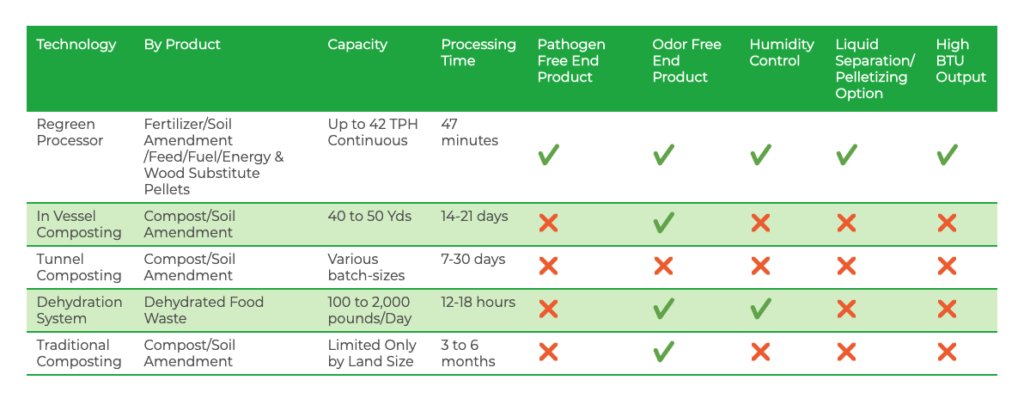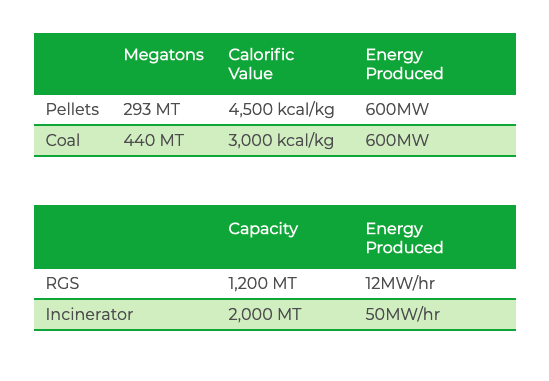REGREEN PANAMA VS COMPOSTING & DEHYDRATION
With Regreen Panama, the process begins by placing waste material on to the initial conveyor.

The Regreen Panama system provides a much larger variety of end products than competing technologies in the organic waste to soils and animal feed market. Our proprietary Radiant Heat Processer is the only one that ensures an end product free of harmful bacteria. What is also a unique advantage for Regreen Panama is the short amount of time it takes to have a stable, finished product. While most processes will eventually reach an odor free state, most take weeks or months to do so. We do it in minutes. While dehydration systems can also control the moisture content of their finished product, they are limited by small batch sizes and a process that takes half a day or longer to complete. State of California testing has determined that dehydration systems do not create a

estable product as the material exhibits the same reactivity to water as unprocessed waste. Therefore, the “finished” product from these systems is still categorized as food waste and not permitted for immediate land application. Regreen Panama process is certified to kill all harmful, hard-to-kill bacteria and suitable for immediate use in any soil or feed application. While Regreen Panama offers a superior alternative to all competing organic waste processing systems, ours is also a complimentary process for traditional composting facilities. Use of a Regreen Panama system significantly increases daily processing capacities, eliminates the need for large plots of land, and provide free liquids which are essential to the composting process.
REGREEN PANAMA VS. ENERGY MARKET COMPETITORS
Regreen Panama processing systems can convert municipal solid waste (MSW), as well as all types of organic wastes, into end products that have good BTU values, consistently delivered at a 5% to 7% moisture content. End product characteristics can be blended for specific applications. All of our end product pellets have tested out as highly-efficient and compatible with any gasification system. Regreen Panama offers both syngas and pyrolysis modules to team with the Regreen Panama Processor to produce electricity, fuels, and marketable byproducts, with no harmful emissions.
Regreen Panama processed organic wastes will provide BTU values of 6,300 to 8,300 per-pound and the residue from use in energy production is a high-value biochar product. If pyrolysis is used, an organic rubber product can also be created. MSW will provide higher BTU values of 8,000 to 11,000 per-pound and the ash has superior bonding properties to coal ash, thus making it marketable as an additive for concrete production.
Anaerobic (and to a lesser extent Aerobic) digestion is currently seen as the preferred technology for organic waste to energy. Both feature a series of biological processes in which microorganisms are used to break down biodegradable material and create a methane gas suitable for use in energy production.
95% of the material processed through anaerobic digestion requires subsequent processing to become a suitable end product. Odor and bacteria issues with the digestate (semi-solids and solids not converted to methane gas by anaerobic digestion) require a lengthy composting process. In addition, anaerobic digestion systems require significant pre-processing of incoming waste material, often employing costly systems to create a slurry from pre-sorted organic material. Lastly, anaerobic digestion systems, in order to handle any volume of waste, must be built in a large and costly fashion and require trained engineers to operate.
Regreen Panama captures and utilizes 100% of the carbon from organic wastes and utilizes 100% of the energy value. Once our pellets are used to create electricity or fuels, the ash is a marketable product with no further processing required. It is also a more valuable end product than compost made from anaerobic digestion digestate.

Coal Fired Power Plants and Similar Facilities Power plants and cement production facilities use coal and other processed fuel (biomass, RDF, etc.) in their operations. Coal is unpopular from an environmental perspective and many coal-fired facilities have closed or will close as a result of legislation. Biomass and RDF alternatives typically have much higher moisture content (20%+) and/or less efficient burn-properties. They cannot produce heat/energy in the environmentally friendly manner Regreen Panama provides. As an energy source, coal is not nearly as efficient as Regreen Panama pellets.
Air pollution and inefficient energy production levels are the main drawbacks to incineration of MSW. It is impossible to burn 30%+ moisture content material efficiently, and too time consuming and costly for these facilities to dry MSW further. This higher moisture content leads to significant air pollution issues, and increased operational costs that have led to facility closures.
A Regreen Panama system, teamed either with a syngas or pyrolysis system, is about twice as efficient as incineration (70% conversion, versus 30% to 40%). Since both Regreen energy production modules capture and control emissions, this type of Regreen Panama power-generation application has none of the pollution issues and associated regulatory problems of incineration.
Let's Bring Less Waste and More Life to Your City.
Let us know your necessities and we provide the system and addons for your specific area.
